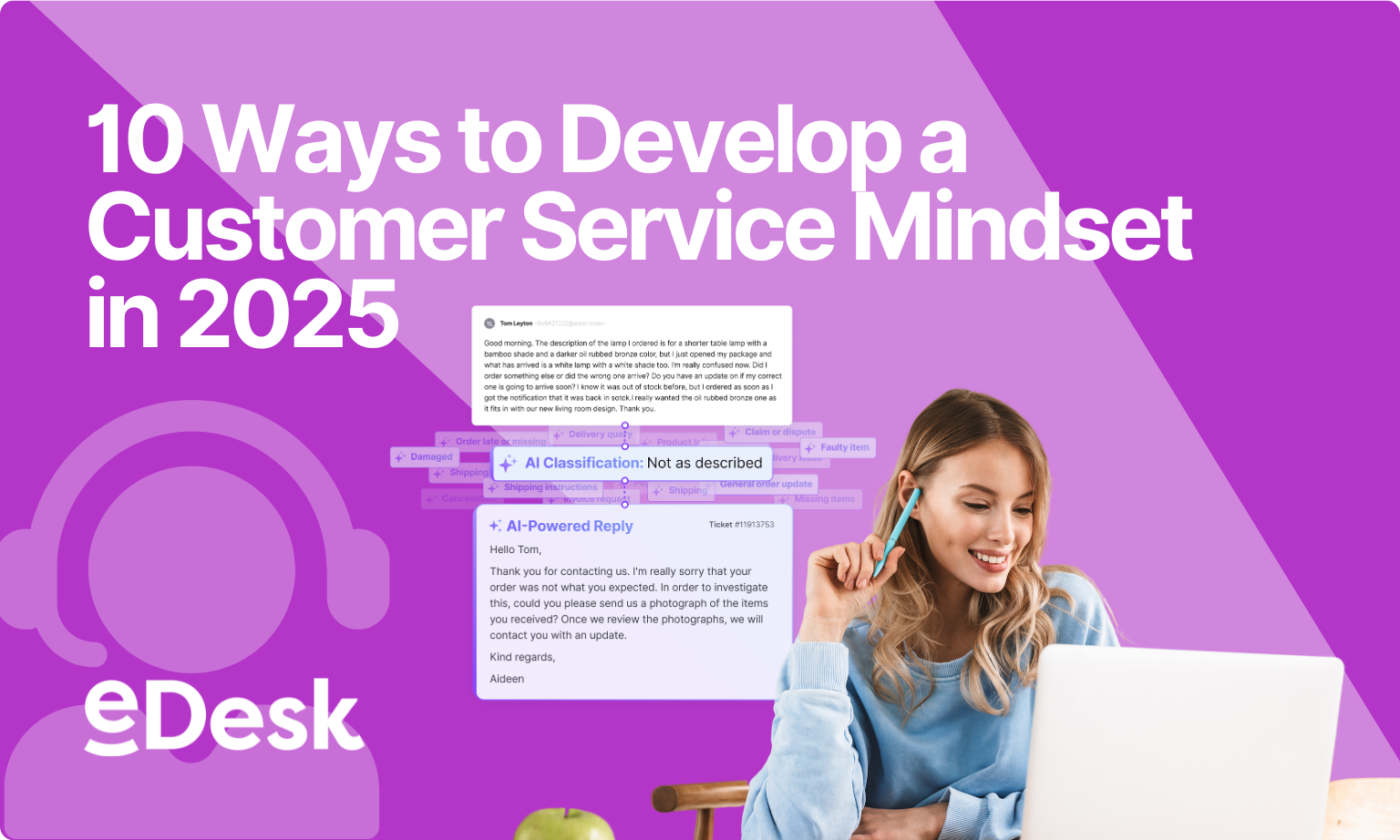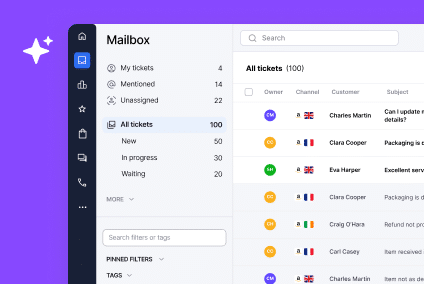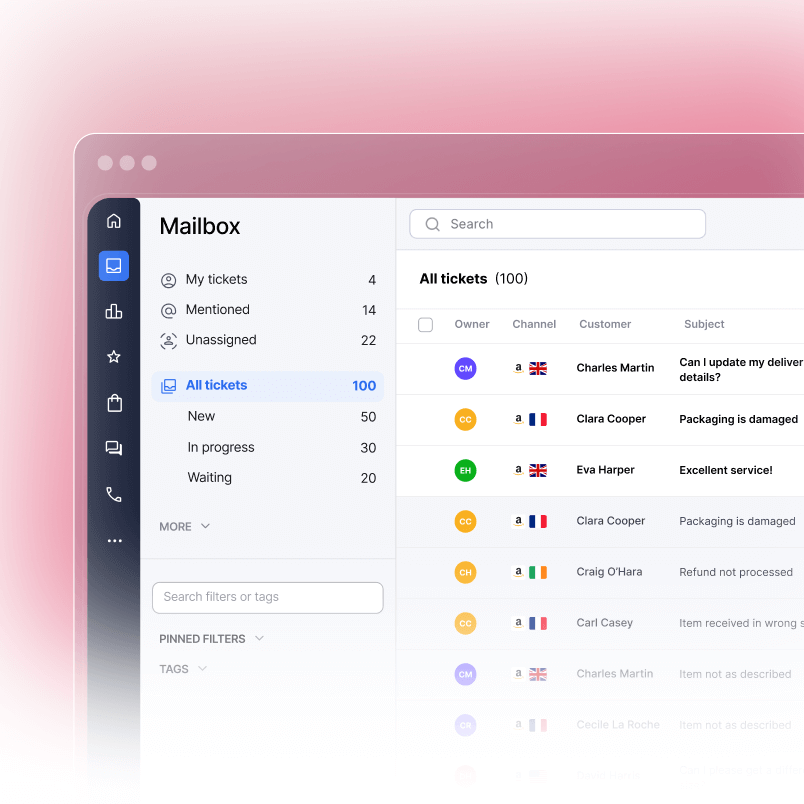Ever watch a skilled barista make your favorite coffee? They balance speed with precision, quality with efficiency, all while maintaining a smile. That’s exactly what excellent customer service feels like: a delicate balancing act that looks effortless.
In the world of customer support, representatives are constantly juggling customers’ needs with practical solutions, all while trying to make the right call in each unique situation.
It’s challenging work, but it’s also incredibly valuable. After all, these team members are the human face of your business. Every interaction they have shapes how customers perceive your entire company.
To deliver the kind of service that keeps customers coming back, agents need several essential tools in their arsenal:
● Training
● Empathy
● Product/service knowledge
● Patience
But there’s another crucial element that doesn’t always get the attention it deserves: a customer service mindset. In this guide, we’ll explore why this particular mindset might just be the most important skill a customer service professional can develop in 2025, and how it drives business success in ways nothing else can.
What is a Customer Service Mindset?

At its heart, a customer service mindset is an approach that not only prioritizes customer needs but actively looks for opportunities to exceed expectations and enhance the overall experience.
You’ll find this mindset in your star performers: those employees who consistently achieve high satisfaction scores while building the kind of customer loyalty that sustains businesses long-term.
What makes this mindset so powerful is its versatility. Because it focuses on delivering exceptional service to every customer and finding solutions regardless of the challenge, it works beautifully across all scenarios, even when dealing with particularly difficult situations, like how to handle angry customers effectively.
Teams that embrace a strong customer-focused mindset don’t just solve problems; they communicate solutions with clarity and compassion. This approach lies at the heart of defining great customer service in today’s competitive business landscape.
Customer Service Mindset Examples
So what does this mindset look like in real-world situations? Let’s paint a picture.
Imagine this scenario: A customer reaches out because they haven’t received their order, and the shipping window has already closed. They’re frustrated and concerned.
The basic approach would be straightforward: check the tracking information, inform the customer of the current status, and provide an estimated delivery date. Problem addressed? Yes. Problem solved in a way that creates a positive impression? Not quite.
Now let’s see how someone with a true customer service mindset might handle the same situation:
They’ll track the order, of course, but they’ll also proactively send detailed tracking information directly to the customer’s email. Then they’ll take ownership by personally contacting the shipping company to flag the order for priority handling. Finally, they’ll acknowledge the inconvenience by offering a 10% discount code for the customer’s next purchase.
See the difference? The first approach merely resolves the issue. The second approach resolves the issue whilst also:
- Saving the customer time and effort
- Demonstrating that the company values the customer’s business
- Providing a tangible gesture of goodwill
- Creating a positive experience from a potentially negative situation
That’s the power of a customer service mindset in action: turning routine interactions into opportunities to strengthen customer relationships.
10 Ways to Develop a Customer Service Mindset in 2025
Ready to cultivate this mindset within your team? Here are 10 proven strategies that can transform your customer service approach in 2025:
1. Walk the Talk: Demonstrate Good Customer Service
A customer service mindset isn’t something you can simply mandate, it needs to be modeled and woven into your company’s DNA. When your organization commits to this philosophy, it must be evident in how customer service operates at every level.
Begin by training all customer-facing staff to recognize and create opportunities to demonstrate this mindset. Role-playing exercises work wonders here: they give your team practical experience with different scenarios while helping them understand what exceptional service looks like in action.
Just as important as training is equipping your team with the right tools. A comprehensive dashboard that centralizes customer interactions makes a tremendous difference. When agents can easily access a customer’s history and see previous tickets in one place, they gain valuable context that helps them anticipate needs and solve problems proactively rather than reactively.
2. Training is Everything
We can’t overstate the importance of thorough training when it comes to developing a customer service mindset. Recent research indicates that 81% of business leaders consider customer experience and support increasingly crucial in 2025, making proper training not just helpful …but essential.
For your team to truly embrace this mindset, they need to understand both the what and the why behind it. Effective training programs should cover customer service fundamentals while also explaining the philosophy of a customer-focused approach. In addition, implementing mentoring software can help track employee progress, provide structured guidance, and ensure consistent skill development across the team.
Create exercises that explore common customer concerns and the variety of customer personalities your team might encounter. Practice handling difficult situations through role-play, and provide clear best practices for transforming challenging interactions into positive experiences.
Remember that confidence is a key component of the customer service mindset. Provide ongoing coaching and personal development opportunities that give your team both the practical skills and psychological foundation to feel secure in their decision-making and empowered to take initiative when helping customers.
3. Take Customer Feedback on Board
One of the clearest ways to demonstrate a customer service mindset is to actively listen to what customers are telling you. When your team shows customers that their input is valued and being used to drive improvements, it reinforces your commitment to service excellence.
Both praise and criticism provide valuable insights. Positive feedback highlights what’s working well, while negative feedback identifies areas for improvement, allowing your team to prepare for and prevent similar issues in the future.
Make feedback collection a systematic process, and ensure it’s shared across departments. When patterns emerge, use them to refine your service processes and approach. This continuous improvement cycle is fundamental to developing a customer support strategy that evolves alongside your customers’ changing expectations.
4. Emphasise Empathy for Customer Issues
Empathy might be the single most powerful tool in your customer service arsenal. Train your team to genuinely step into the customer’s situation and consider: If this were happening to me, how would I feel? What kind of resolution would I want?
True empathy transforms customer service from a transaction into a human connection. It starts with authentic listening, i.e. teaching your team to hear not just the words customers say but the concerns, frustrations, or needs behind them. When representatives truly understand the customer’s perspective, they can craft solutions that address both practical issues and emotional concerns.
As a leader, foster empathy throughout your organizational culture. The way you listen to and support your employees will naturally influence how they interact with customers. Empathy is contagious: when it flows from leadership to employees, it will naturally extend to customer interactions as well.
5. Build Customer Relationships
Every interaction with a customer is a building block in a potentially long-term relationship. This relationship-focused perspective should be central to your customer service mindset.
While efficient problem-solving matters, customer service transcends mere issue resolution: it’s about creating connections that foster loyalty to your brand. These relationships drive repeat business and recommendations, becoming a powerful engine for sustainable growth.
Help your team develop relationship-building skills through targeted training. Create scenarios where they can practice:
● Maintaining a warm, personable tone throughout interactions
● Practising active listening without interruption
● Engaging in authentic conversations rather than script-reading
● Explaining solutions thoroughly so customers feel informed and cared for
When your team views each interaction as an opportunity to deepen customer relationships rather than just another ticket to close, they’ll naturally deliver service that reflects a true customer service mindset. This approach perfectly aligns with the key principles of eCommerce customer service that emphasize building lasting connections with online shoppers.
6. Incentivise your Employees
Developing a customer service mindset requires both training and reinforcement. Strategic incentives can be remarkably effective in encouraging your team to consistently apply this mindset in their daily interactions.
Consider creating quarterly or monthly recognition programs. You might reward representatives who achieve the highest satisfaction scores or those who collect particularly valuable customer feedback. Team-based incentives can also be powerful: rewarding groups that collaborate effectively to deliver exceptional, timely service.
Be creative with your incentive programs. The right mix of recognition and rewards can significantly impact both performance and motivation. Recent data shows that 76% of employees report higher engagement when they experience empathy from leadership, highlighting how recognition strengthens the service-oriented mindset you’re trying to foster.
7. Recognise Employee Customer Mindset Success
Beyond structured incentive programs, look for opportunities to recognize and celebrate examples of outstanding customer service mindset in action.
Instead of creating competitive environments where only top performers receive recognition, consider setting achievement thresholds that any employee can reach. When a team member hits a specific customer satisfaction benchmark or receives exceptional feedback, acknowledge their success with a bonus or special recognition.
This inclusive approach to recognition motivates every team member to excel, as success becomes accessible to anyone willing to embrace the customer service mindset. It reinforces the message that this mindset isn’t just for “customer service stars”: it’s an approach everyone can and should adopt in every customer interaction.
8. Instill a Positive Company Culture
The customer service mindset flourishes in the right environment. If you want your team to treat customers with warmth, respect, and positivity, create a workplace where those same qualities characterize internal interactions.
A positive company culture shines through in customer encounters. After all, it’s nearly impossible for employees to consistently deliver upbeat, helpful service if they’re working in a negative environment. Focus on building a workplace where positivity, respect, and a can-do attitude are the norm.
This kind of culture creates a virtuous cycle where team members feel motivated to contribute to collective success and genuinely want to see both colleagues and the business thrive. Research confirms the business impact of this approach: studies show that customer-obsessed organizations achieved 41% faster revenue growth than their counterparts without this focus in 2025.
9. Offer Opportunities That Aren’t Customer Facing
Customer service roles can be emotionally demanding, and burnout is a real concern. To maintain your team’s wellbeing and keep their enthusiasm fresh, consider offering occasional opportunities to step away from direct customer service and contribute to the business in different ways.
For example, your representatives might spend a few weeks collaborating with the product team to provide front-line insights into common customer challenges. Or, they could work with marketing to help shape messaging that speaks to real customer needs and pain points.
These breaks from customer-facing duties help team members return to their roles refreshed and reinvigorated. They also create valuable cross-functional knowledge, to develop a deeper understanding of different aspects of the business and how they all work together to serve the customer.
10. Take a Customer-Centric Approach to Problem Solving
While guidelines and protocols have their place in customer service, a true customer service mindset sometimes requires flexibility. Empower your team to occasionally step outside rigid processes when it serves the customer’s best interests.
When representatives have the latitude to view situations from the customer’s perspective and tailor solutions accordingly, they can move beyond formulaic fixes to create genuinely satisfying resolutions. This approach leads to higher satisfaction ratings and stronger customer loyalty: the ultimate goal of cultivating a customer service mindset.
For additional insights on implementing this flexible, customer-centric approach, explore our guide to essential tips for eCommerce customer service.
How to Develop a Customer Service Mindset
Professional development experts often note that mindset is the foundation of meaningful change. This principle applies equally to personal growth and professional development in customer service.
The customer service mindset isn’t merely a technique or approach, it’s a comprehensive philosophy that transforms how we think about and approach customer interactions. It reorients our perspective to see situations through the customer’s eyes while constantly seeking opportunities to add unexpected value.
As mindset expert Steve Maraboli wisely observed, “Once your mindset changes, everything on the outside will change along with it.”
Implementing a customer service mindset can be transformative for your business in 2025, with research showing that 87% of consumers place greater trust in companies that deliver excellent customer experiences.
By cultivating this customer-first mentality, investing in comprehensive training, and creating a culture that celebrates exceptional service, you’ll distinguish your business in a marketplace where 85% of consumers will actively seek out companies offering superior customer service experiences.




